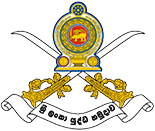ARMY ENGINEERS, prime movers engaged in the arduous task of removing LTTE laid minefields since beginning of De-mining projects received further teeth when China during a brief ceremony Monday (1) morning donated a stock of 50 De-mining Detectors and 50 De-mining Protective Equipment for the use of Army De-miners, now conducting humanitarian de-mining operations in the North.
Hon. Prime Minister Ratnasiri Wickramanayake, Chief Guest representing the Government of Sri Lanka after receipt of the equipment symbolically from Ms Yang Xiuping, Ambassador for People’s Republic of China on the occasion handed them over afterwards to Commander of the Army Lieutenant General Jagath Jayasuriya during the brief ceremony at Prime Minister’s office, Colombo. Mr M D Bandusena, Secretary to Hon. Prime Minister, Mr W.K Kumarasiri Secretary to Ministry of Nation Building and Estate Infrastructure Development, Army Chief Field Engineer, Brigadier Udaya Nanayakkara and several senior officers in the Premier’s office attended the occasion. Ministry of Nation Building and Estate Infrastructure Development coordinated the donation on behalf of the Government of Sri Lanka.
Today’s donation, valued at Rs. 50 million is expected to accelerate ongoing Army de-mining operations in the north as resettlement, reconstructions and rehabilitation was fast taking place under ‘Uthuru Wasanthaya’ (Northern Spring) programme, spearheaded by the Government of Sri Lanka.
China as one of the leading international partners for northern development has also donated 6252 tents and 34 more heavy machinery and equipment to be used for resettlement and reconstruction work in the North. Monday’s donation of de-mining equipment, considered as a great symbol of goodwill and relations between the People’s Republic of China and Sri Lanka, comes as a stimulus for Army Engineers who are heavily committed in mine clearing operations along A-9 Road from Paranthan to Elephant-Pass and to Muhamalai.
Army de-miners are also active in the north of Thunukkai, Manthivu, Oddusuddan and Kokavil areas where the Tiger terrorists had seemingly planted the most number of mines and other explosive devices.
Around 1,000 Army de-mining troops have already cleared approximately 200 sq km in the Jaffna, Killinochchi, Mullaitivu and Mannar districts using 29 de-mining equipment by 20th February 2010. A total number of 822 Anti Personnel Mines, an Anti tank mine and 304 unexploded explosive devices had also been removed in the process of de-mining by the mid of February, this year, according to statistics in the Army Engineers.
The de-mining process has been accelerated in the North on the instructions of President Mahinda Rajapaksa and implemented by the Special Task Force, headed by Senior Presidential Advisor Basil Rajapaksa as part of the Uthuru Wasanthaya programme, in order to resettle the IDPs at their original places. The process of de-mining in the liberated area is given high priority in the resettlement agenda to meet the deadlines.
The de-mining process has been almost completed in most parts of the Killinochchi district too, enabling around 90,000 IDPs to return to their villages safely.
While the troops are conducting de-mining work, there are a few more NGOs and INGOs, involved in the same mine clearing operations. The UNCHR has also provided five de-mining flail machines to help accelerate humanitarian mine clearing operations in former conflict-affected areas.
The Japanese Government has also funded around US$ 2.1 million for humanitarian de-mining work through de-mining actors such as Danish De-mining Group, HALLO Trust and FSD (Swiss Foundation for Mine Action).
Another US$ 6 million was provided by the US Government for the humanitarian de-mining activities in the North. The Indian Government had also extended support in the de-mining process sending logistic and manpower assistance to expedite the process.
The Australian Government recently donated five de-mining machines, worth Rs 250 million to carry out the de-mining work and make the areas safe for return of IDPs.
Humanitarian de-mining and removal of unexploded ordnance (UXO) are pre-requisites for delivery of humanitarian assistance, early recovery and development in conflict affected areas. De-mining also enables infrastructure development and the resumption of social services and livelihoods.
 |
 |
 |
 |
 |
 |
 |
 |
 |
 |
 |

